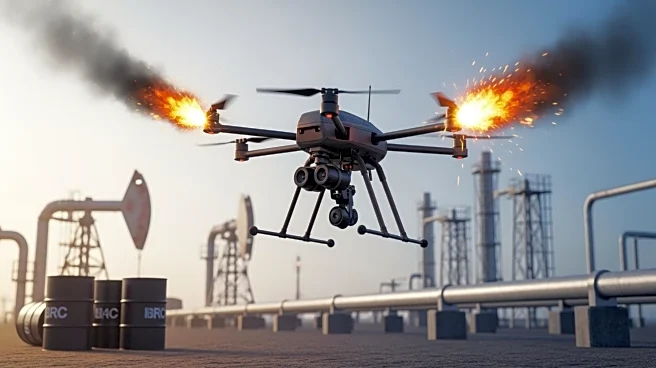What's Happening?
Ukraine has launched a series of drone attacks targeting Russia's energy infrastructure, aiming to disrupt the country's oil supply chain. Since August, Ukraine has conducted at least 58 strikes on key Russian energy sites, including refineries, pumping
stations, and export terminals. These attacks have significantly impacted Russia's refining capacity, causing shortages of gasoline and diesel, and reshaping the country's energy trade. The strikes have led to a rise in domestic gasoline prices and sporadic queues at filling stations in Russia. Ukraine's strategy involves using long-range drones to hit targets deep within Russian territory, with the goal of creating shortages of key products and hindering Moscow's war efforts. The campaign has intensified as Ukraine seeks to leverage its drone capabilities to counter Russian advances.
Why It's Important?
The drone strikes on Russia's energy infrastructure are a critical component of Ukraine's strategy to weaken Russia's war economy. Oil and gas sales are a major source of revenue for the Russian government, and disruptions to these sectors could have significant economic implications. The attacks have already led to a decrease in refining and an increase in crude exports, affecting Russia's ability to maintain its oil output. This shift in energy trade dynamics could pressure Russia to negotiate, as the economic strain from reduced oil revenues mounts. Additionally, the strikes highlight the evolving nature of warfare, with drones playing a pivotal role in modern conflict. The situation underscores the importance of energy security and the potential for geopolitical shifts as countries adapt to new military technologies.
What's Next?
Ukraine's continued drone campaign is likely to further strain Russia's energy sector, potentially leading to more significant disruptions in oil supply and refining capacity. As Ukraine ramps up its drone production, the frequency and scale of attacks may increase, challenging Russia's air defenses. The international community, particularly Western allies, may face pressure to respond to the escalating conflict, either through diplomatic channels or by providing additional support to Ukraine. The situation also raises questions about the long-term impact on global energy markets, as disruptions in Russian oil exports could affect supply chains and pricing worldwide.
Beyond the Headlines
The use of drones in Ukraine's strategy against Russia highlights ethical and legal considerations in modern warfare. The ability to conduct long-range strikes raises questions about the rules of engagement and the potential for civilian casualties. Additionally, the focus on energy infrastructure as a target underscores the vulnerability of critical systems in conflict zones. The situation may prompt discussions on international regulations governing drone warfare and the protection of civilian infrastructure during armed conflicts.















